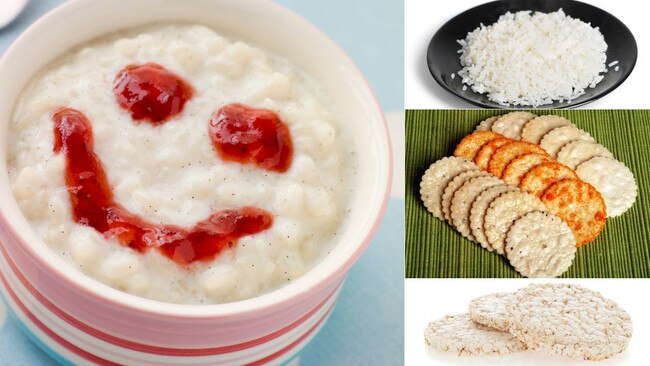Australian scientists fear arsenic levels in crackers too high for kids
Young kids who feast on products containing rice may be exposed to dangerous amounts of arsenic, scientists say, as it’s revealed three-quarters of rice-based products in Australia have concentrations exceeding European guidelines.

QLD News
Don't miss out on the headlines from QLD News. Followed categories will be added to My News.
KIDS who feast on popular rice crackers may be exposed to dangerous amounts of arsenic, Australian scientists have found.
Research has found that 75 per cent of rice-based products have concentrations of arsenic that exceeded European guidelines for safe rice consumption for babies and toddlers — Australia has no safety standards specifically for children.
GREAT WHITE DIET HAS POTENTIAL TO CAUSE HEALTH PROBLEMS IN CHILDREN
The study, published in the International Journal of Environmental Research and Public Health, found Australian children who eat large amounts of rice-based food may be exposed to dangerous amounts of arsenic.
Senior researcher Associate Professor Suzie Reichman, an environmental toxicologist at RMIT University, said the research used European guidelines because Australia does not have safety standards specifically for children.
“While all the products we tested meet Australian guidelines, these do not reflect the latest scientific understanding on how arsenic affects the body,” Assoc Prof Reichman said.
BABIES MOVING FROM BREAST TO JUNK SPARKS CALL FOR TOTS’ DIETARY GUIDE
“Children are far more vulnerable to the long-term toxic effect of metals like arsenic, but our rice guidelines are based on adults. The guidelines are also based on out-of-date dietary habits, when rice was generally eaten less often by Australian families. This study shows the need to develop new standards specifically for children and ensure our guidelines are in line with what we now know about safe rice consumption,” she said.
The scientist said rice-based products were a popular alternative for the growing number of children with gluten intolerances.
“Rice can be safely eaten as part of a well-rounded, balanced diet but if it’s a child’s main source of carbohydrates, that could be a problem. As a general rule, we recommend that children under five eat rice in moderation and parents should avoid serving rice at every meal, to minimise the risk of exposure to arsenic,” she said.
PARENTS NEED MORE INFORMATION ON FAST FOOD CHILDREN’S MENUS
Arsenic is a naturally occurring metal widely found in air, soil and groundwater that comes in both organic and inorganic forms. Organic arsenic is relatively safe but inorganic arsenic is a carcinogen linked with cancers of the bladder and skin. Long-term exposure to high amounts of inorganic arsenic is dangerous to human health.
The study tested 39 rice products for babies and toddlers found in Australian supermarkets, including milk formula powder, cereal, crackers and pasta made from brown, white, organic and non-organic rice.




